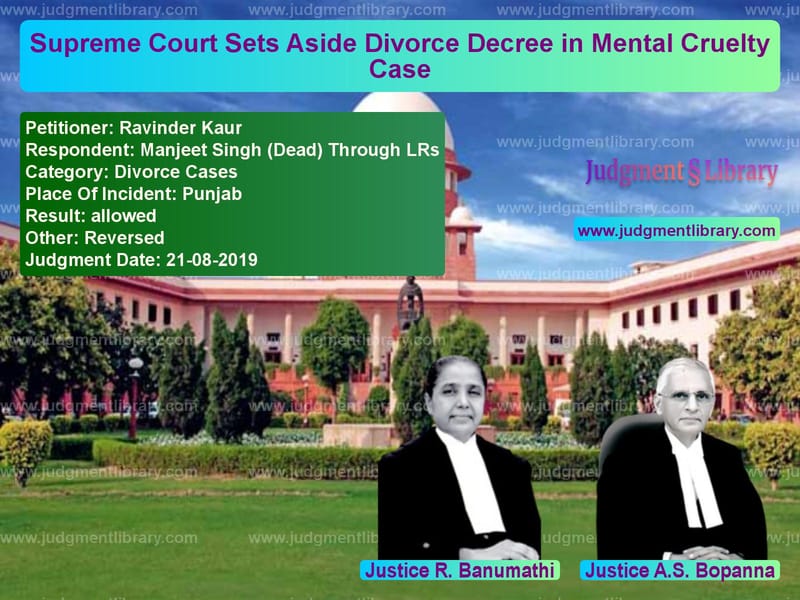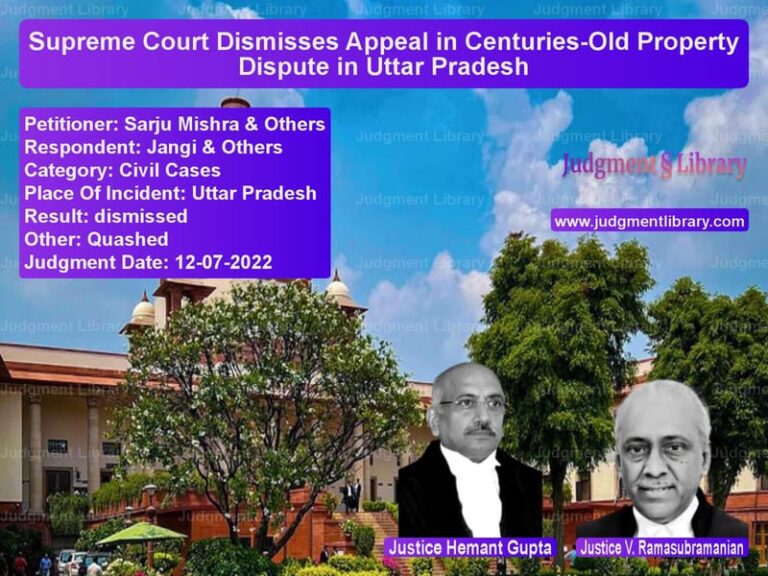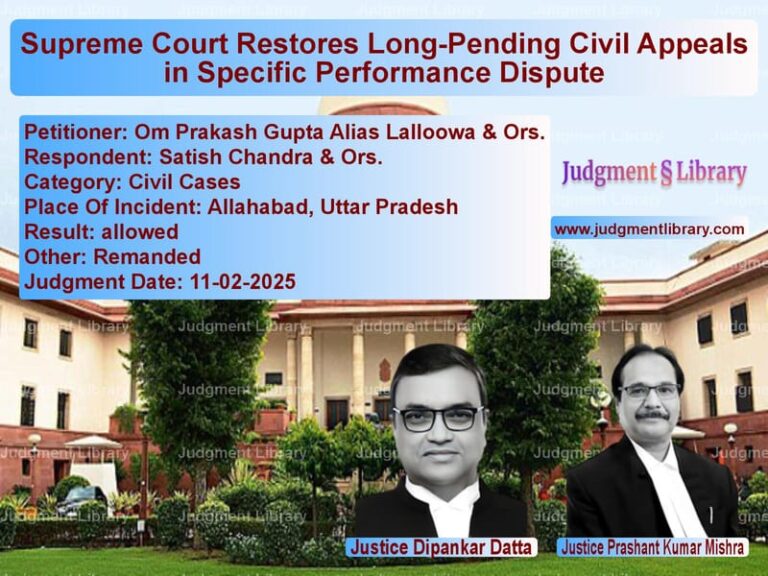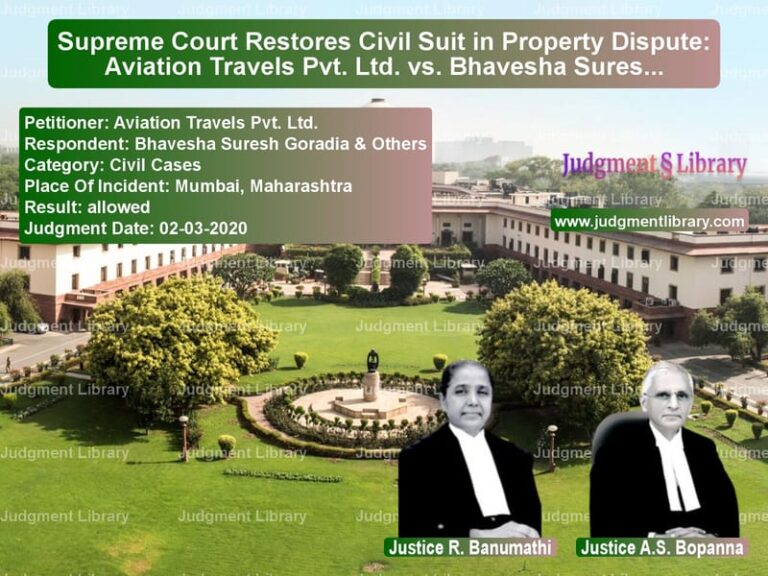Supreme Court Sets Aside Divorce Decree in Mental Cruelty Case
The case of Ravinder Kaur vs. Manjeet Singh (Dead) Through LRs revolved around allegations of mental cruelty as grounds for divorce. The Supreme Court, in its judgment dated 21st August 2019, overturned the Punjab and Haryana High Court’s decision, which had dissolved the marriage between the appellant and her late husband. The ruling highlights the importance of assessing cruelty allegations with due consideration to evidence and the conduct of both spouses.
Background of the Case
The appellant, Ravinder Kaur, was married to the respondent, Manjeet Singh, in December 1970 as per Sikh rites. The couple had two sons and a daughter. After 25 years of marriage, Manjeet Singh filed for divorce under Section 13 of the Hindu Marriage Act in 1995, alleging mental cruelty by the appellant.
He claimed that the appellant had falsely accused him of having an extramarital affair and had filed complaints against him with the police. He also alleged that she prevented him from entering the house and sought to evict him.
The trial court dismissed the divorce petition, holding that the allegations did not constitute cruelty warranting dissolution of marriage. However, the High Court reversed this decision and granted a divorce. Ravinder Kaur then appealed to the Supreme Court.
Key Issues in Dispute
- Whether the allegations made by the appellant against her husband amounted to mental cruelty.
- Whether the High Court erred in reversing the trial court’s findings.
- Whether false accusations and legal actions by the appellant justified the dissolution of marriage.
- Whether the marriage had irretrievably broken down and warranted judicial intervention.
Arguments by the Petitioner (Ravinder Kaur)
- The respondent’s allegations were exaggerated and not supported by credible evidence.
- The appellant had reasonable grounds to question her husband’s relationship with another woman.
- The complaints filed with the police were made to protect her rights and property, not to harass her husband.
- The trial court had correctly dismissed the divorce petition, and the High Court wrongly overturned it.
Arguments by the Respondents (Manjeet Singh’s Legal Representatives)
- The appellant subjected the respondent to false allegations and unnecessary legal actions.
- Her repeated complaints to the police and legal claims against the respondent caused mental trauma.
- The marriage had broken down irretrievably, making reconciliation impossible.
- The High Court correctly found that continued cohabitation was not viable.
Supreme Court’s Observations
1. Allegations of Infidelity and Mental Cruelty
The Supreme Court emphasized that mere allegations of extramarital affairs, if unsubstantiated, do not automatically amount to cruelty. The Court observed:
“Allegations regarding an extramarital affair must be supported by strong evidence. If the allegations are made in good faith and based on reasonable suspicion, they do not amount to cruelty.”
2. Justification of Police Complaints
The Court examined the appellant’s complaints to the police and found that they were not entirely baseless. It ruled:
“A spouse has the right to approach legal authorities for protection. Filing a complaint does not automatically constitute cruelty unless it is shown that the complaint was filed with malicious intent.”
3. Irretrievable Breakdown of Marriage
The Court rejected the argument that the marriage had irretrievably broken down, stating that irretrievable breakdown is not a ground for divorce under Indian law. It noted:
“Irretrievable breakdown of marriage is not a statutory ground for divorce under the Hindu Marriage Act. Courts must rely on legal grounds recognized by the statute.”
Final Verdict
- The Supreme Court set aside the Punjab and Haryana High Court’s ruling.
- The trial court’s decision rejecting the divorce petition was restored.
- The appellant’s marital status remained intact despite the respondent’s death.
Implications of the Judgment
- Reaffirms that unproven allegations of infidelity do not constitute mental cruelty.
- Protects the rights of spouses to seek legal remedies without fear of it being used against them.
- Clarifies that irretrievable breakdown of marriage is not a legally recognized ground for divorce.
- Prevents courts from overturning well-reasoned trial court judgments without strong justification.
Conclusion
The Supreme Court’s ruling in this case underscores the need for courts to carefully assess claims of cruelty in divorce cases. The judgment ensures that legal actions taken by spouses in good faith are not misused as grounds for divorce. It also reinforces that courts must strictly adhere to statutory provisions rather than granting divorce based on subjective assessments of marital breakdown. This case serves as an important precedent in family law, particularly regarding mental cruelty and the judicial role in matrimonial disputes.
Petitioner Name: Ravinder Kaur.Respondent Name: Manjeet Singh (Dead) Through LRs.Judgment By: Justice R. Banumathi, Justice A.S. Bopanna.Place Of Incident: Punjab.Judgment Date: 21-08-2019.
Don’t miss out on the full details! Download the complete judgment in PDF format below and gain valuable insights instantly!
Download Judgment: Ravinder Kaur vs Manjeet Singh (Dead) Supreme Court of India Judgment Dated 21-08-2019.pdf
Direct Downlaod Judgment: Direct downlaod this Judgment
See all petitions in Alimony and Maintenance
See all petitions in Domestic Violence
See all petitions in Judgment by R. Banumathi
See all petitions in Judgment by A. S. Bopanna
See all petitions in allowed
See all petitions in Reversed
See all petitions in supreme court of India judgments August 2019
See all petitions in 2019 judgments
See all posts in Divorce Cases Category
See all allowed petitions in Divorce Cases Category
See all Dismissed petitions in Divorce Cases Category
See all partially allowed petitions in Divorce Cases Category







